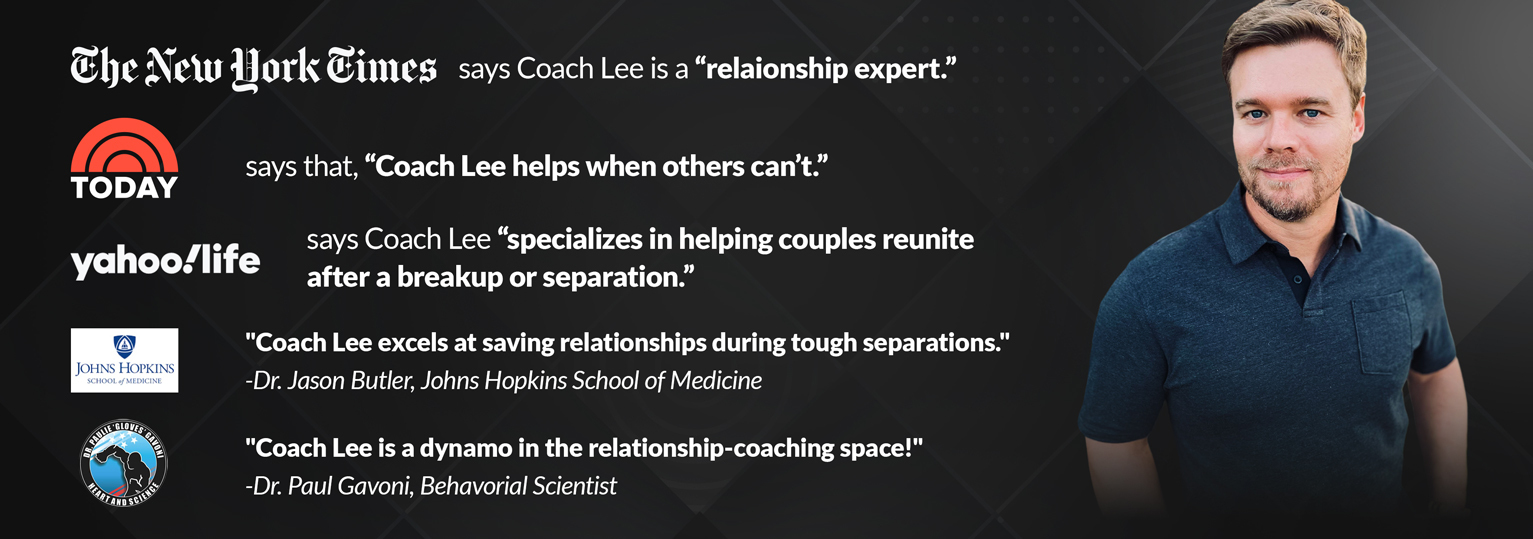
1.6M
Downloads
218
Episodes
Coach Lee is a world-renown relationship coach who helps people get an ex back after a breakup, save a marriage, and become more attractive.
Lee has coached people in relationships since 2000. His website is https://MyExBackCoach.com and includes hundreds of articles and videos.
Lee has lectured at Pepperdine University and others, is a TED educator on the science of breakups, and has been interviewed by major media including The New York Times, USA Today, The Today Show, New York Post, Men’s Health, L.A. Business Journal, Cosmopolitan, Daily Mail, Metro UK, Bravo TV, Yahoo Lifestyle, Glamor, and MSN among others.
Lee uses real-life experience with breakups along with his work for 20 years providing relationship-recovery coaching. He has multiple certifications for relationship coaching & consulting.
Get information on his Emergency Breakup Kit & Emergency Marriage Kit at MyExBackCoach.com.
SUBSCRIBE to this podcast as well as on YouTube at https://youtube.com/myexbackcoach so you don’t miss videos on saving relationships, keeping love strong, and the science of attraction. INSTAGRAM @RealCoachLee
Episodes

Saturday Jul 31, 2021
Limerence
Saturday Jul 31, 2021
Saturday Jul 31, 2021
What is limerence? In this podcast, relationship strategist Coach Lee, discusses the mental state of limerence and what you can do if your spouse or ex boyfriend/girlfriend is having a limerence affair with someone.
Coach Lee compares limerence vs love and discusses what you can do if they are infatuated with this other person (known as the limerent object).
If your marriage is in trouble and you are separated due to your spouse having a limerence affair, this video will explain what is going on and why it seems you can't compete with this other person. So what is Limerence? It is a state of mind where people often leave marriages or long term, stable relationships to, instead, be with someone they haven't known for a long time at all but have amazing, sky-high feelings for. Dr. Tennov studied people in this infatuation and coined the term/word “limerence.”
Coach Lee will also discuss how you may fight for the heart of the one you love if they are in Limerence. When a spouse, boyfriend, or girlfriend is experiencing limerence, they are under the influence of the chemicals associated with that mental state. Those brain chemicals are mainly dopamine and serotonin.
The ex lover or spouse in limerence is addicted to those chemical highs and is always chasing the greatest high experienced from the relationship. What they don't realize is that they can never duplicate that high again - though they might come close. Over time the highs get lower and lower until the person feels they have “fallen out of love.” They will then be vulnerable to chasing that high through the host of another person.
For more information, watch Coach Lee's video on Limerence and see his post at What is Limerence?
On Medium at: What Is Limerence in Relationships?
Understanding Limerence: The Intense World of Romantic Obsession
What is Limerence?
Limerence, a term coined by Dr. Dorothy Tennov many years ago, describes an intense, often overwhelming romantic desire. It's a state of mind characterized by an all-consuming passion and longing for another person, typically someone with whom the individual has not had a long-standing relationship. Those in the throes of limerence might find themselves leaving behind stable, long-term relationships for a whirlwind romance filled with sky-high emotions and a sense of urgency.
The Characteristics of Limerence:
Limerence is more than just a crush or infatuation; it is an addictive state. Individuals in limerence experience a powerful attraction to another person, often believing they have never felt this way before. This condition is marked by a series of intense emotions and a significant chemical reaction in the brain. Key characteristics include:
- Intense Emotional Attachment: Individuals feel an overwhelming emotional attachment to the person of their desire, often believing this person is the only one who can fulfill them.
- Idealization: The object of limerence, or the "limerent object," is often placed on a pedestal, idealized to an unrealistic degree.
- Intrusive Thoughts: Those experiencing limerence find themselves constantly thinking about the other person, to the extent that it may interfere with their daily life.
- Emotional Dependence: Their mood and overall well-being seem entirely dependent on their interactions with the limerent object.
- Fear of Rejection: Despite the intense desire, there's also an acute fear of rejection from the limerent object, leading to a range of behaviors from shyness to extreme efforts to please.
The Chemical High of Limerence:
At its core, limerence is driven by a cocktail of chemicals in the brain. Dopamine, the feel-good neurotransmitter, spikes, leading to feelings of pleasure and reward. Meanwhile, changes in serotonin levels can disrupt rational thinking and decision-making, explaining why those in limerence often make seemingly irrational choices, like leaving a stable partner for a new, uncertain relationship. This chemical high can lead individuals to act out of character, prioritizing the pursuit of this new romantic interest above all else.
The Role of Limerence in Relationships:
While often disruptive and painful, especially when it leads to the end of long-term relationships, limerence does have a role in human romantic interaction. In the early stages of a relationship, limerence can serve to bring people together, creating a strong bond that motivates them to pursue a deeper connection. The intense desire to know everything about the other person and share everything about oneself can lay the groundwork for a future relationship. However, for limerence to transition into a stable, long-term partnership, it must evolve into deeper forms of love and attachment.
Limerence vs. Rebound Relationships:
Limerence is often at the core of what many refer to as rebound relationships. After a breakup, individuals might quickly find themselves intensely attracted to someone new. These relationships are typically labeled "rebounds" due to their sudden onset and the common belief that they are merely a way to fill the void left by the previous relationship. While not all rebound relationships are driven by limerence, many exhibit similar patterns of idealization and intense emotional investment.
Dealing with Limerence:
If you find yourself or someone close to you caught in the grip of limerence, understanding that it is a temporary and often illogical state can be comforting. Recognizing the signs and acknowledging the chemical aspect of the attraction can help in managing the feelings and making more rational decisions. For those who are on the receiving end of someone's limerent affection, it's important to set clear boundaries and not exploit the situation, as the emotional stakes are incredibly high.
When Limerence Fades:
Limerence is not a permanent state. Over time, the intense feelings begin to fade, and individuals may start to see their limerent object more realistically. This transition period can be challenging, as the emotional withdrawal can feel similar to overcoming an addiction. The end of limerence is often marked by statements like "the spark is gone" or "I love you, but I'm not in love with you." It's crucial for individuals to navigate this phase carefully, ideally transitioning into a more mature, stable form of love.
Conclusion:
Limerence is a powerful and often bewildering experience, marked by intense emotional highs, irrational behaviors, and significant changes in brain chemistry. While it plays a role in drawing people together and can lead to meaningful relationships, it's important to recognize its temporary nature and potential for disruption. Understanding limerence, its symptoms, and its impact on relationships can help individuals navigate their romantic lives more wisely, making decisions that lead to healthier, more sustainable partnerships. Whether you're experiencing limerence, know someone who is, or are simply fascinated by this aspect of human emotion, appreciating the complexity of these feelings is a step toward more profound emotional intelligence and relationship satisfaction.

No comments yet. Be the first to say something!